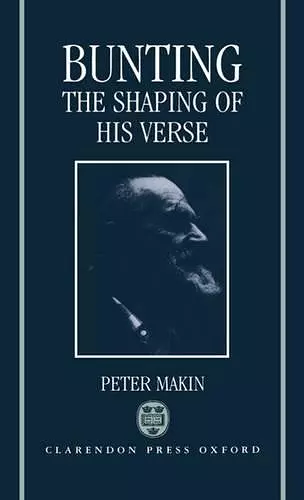Bunting: The Shaping of His Verse
Format:Hardback
Publisher:Oxford University Press
Published:6th Feb '92
Currently unavailable, and unfortunately no date known when it will be back

A substantial portion of Bunting's poems circulated, unheeded, half a century ago. Yet, more than twenty-five years after the publication of his masterpiece Briggflatts, this is is the first critical study to show the view of writing that fused Bunting's intense concerns with music, painting, and Northern culture, and made him the central British poet of the post-war era. Peter Makin's lucid sequence of exposition leads from the more approachable data of Bunting's life and writings to their relations with form and finally theory. Of particular interest are chapters on the saints and warriors that occupy a central position in Briggflatts and on the forms of music and of Northumbrian painting and writing that help determine its structure. Bunting was both realist - his poetry was `about life' - and profoundly formalist. His arguments clash, and cannot be made to match up. Yet they demand examination, not only because they gave rise to his verse, but because they undercut some of the more dangerous critical tendencies of our day. This study reveals Bunting as a major figure both in the development of the modernist movement and of twentieth-century British poetry as a whole.
`with the publication of Peter Makin's Bunting: the Shaping of His Verse, the case for Bunting has been made at book-length by a superb advocate ... In Peter Makin, Bunting has found a reader whose judgments are as independent and as deeply grounded in firsthand knowledge and experience as his own ... Makin is particularly good on sound in poetry. Of all the themes in this rich study, it is the one with most general application, sufficient by itself to engage anyone with an interest in poetry' Magill's Literary Annual 1993
`Future writers will find 'competing with' Makin a daunting task: in Bunting: The Shaping of his Verse we have a deep, thoroughly researched and well-presented study of a complex subject which scholars have shied away from for many years. Makin brings to his subject a considerable warmth and sympathy, and above all, readability: for that we may thank him, as Bunting certainly would, even though he omce said, 'There is no excuse for literary criticism'.' Richard Caddel, Durham University Journal
`Makin shows that Bunting managed to combine modernism with a concern for the matter of England, a standing rebuke to the little-England tradition represented by Philip Larkin. His book should be welcome both to scholars and to poets.' Lachlan MacKinnon, Times Literary Supplement
'brilliant, readable and indispensable book ... As a book to re-read and ponder over it is a must for any self-respecting academic library whether personal or institutional. For Basil Bunting there was no Secret to be grasped: understood, things would not be found to resolve to One Centre. The world 'of daylight and full consciousness is, above all, opaque and complex' and it is through these interwoven complexities that Peter Makin so excitingly guides us.' Ian Brinton, The Use of English, Volume 44, Number 1, Autumn 1992
'... superior full-length critical study ... many footnotes contain essential new material that helps understanding of the poems ... A student reading this book for information and opinion on a certain Bunting poem will find it. A professional scholar of literary modernism and British poetry will find documentary completeness, admiarable integration of work and life, and thoughtful context-building on the art and history of the neglected north.' Donald Wesling, University of California, San Diego. Modernism 1:2 5/94
'... erudite survey ... Makin's impressive knowledge of Pound's work enables him to comment authoritatively on Bunting's divergence from Pound's political views.' Alan Robinson. Review of English Studies Vol 45. No 179 Aug '94
one of the best books of literary criticism I have ever read ... The book's thoroughgoing intelligence is born from love of its subject-matter, not from cleverness or fashionablenmess, though it is certainly clever as well, and it is far from old-fashioned. * Times Literary Supplement *
ISBN: 9780198112549
Dimensions: 223mm x 144mm x 29mm
Weight: 644g
390 pages